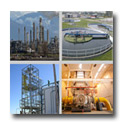The major countries producing phosphate based fertilsers are Morocco, and the Southern States of North America.
The major starting point for the phosphate fertilisers is phosphoric acid and the production of the acid is mainly produced using the wet process. (see Diaval application Sheets)
Very simply, phosphate rock is reacted with sulphuric acid to produce the phosphoric acid and bi-products of gypsum and various acid gases.
To the Plant Enginer and Corrosion Chemist the reaction is a simple one and the choice of valves and pumps straight forward.
However the practical side of the process is far more demanding.
Firstly their is the phosphate ore or rock to handle, then the application of highly corrosive chemicals and finally the impurites such as fluorides to contend with.
The use of glass lined reaction vessels and valves can not be considered due to attack by fluoirde.
To the Plant Engineer and Corossion Chemist, the availablity of Diaval Diaphragm Valves has solved many of the practical problems.
Diaval Diaphragm Valves, with their avalability of many linings and diaphragm grades have shown to be the major choice when considering valves to handle phosphoric acid.
Isobutylene is perhaps the most economic of linings avalable offering both resistance to the phosphoric acid and fluorine derivatives found in the acid.
In the more critical areas the use of Austenic Stainless Steels offer the Corossion Chemist accepable low
corrosion rates of between 0.03 and 2.0 mm/year.
In more recent years the introduction of flurocarbon linings has added to the choice of materials available in handling phosphoric acid.
Diaval is able to offer the Plant enginer and Corrosion chemist the widest range of polymer linings and ‘all-metal’ diaphragm valves for the handling of phosphoric acid.
With many years of experience in the application of diaphragm valve materials to handle phosphorice acid please contact the Diaval Technical Section. |





